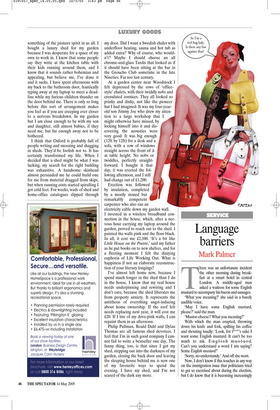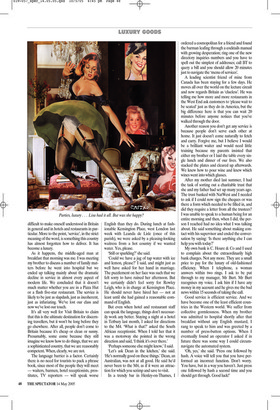Language barriers
Mark Palmer
There was an unfortunate incident the other morning during breakfast at a smart hotel in central London. A middle-aged man asked a waitress for some English mustard to accompany his bacon and sausages.
‘What you meaning?’ she said in a barely audible voice.
‘May I have some English mustard, please?’ said the man.
‘Mustor-cheese? What you meaning?’ With which the man erupted, throwing down his knife and fork, spilling his coffee and shouting loudly: ‘Look, for f***’s sake I want some English mustard. It can’t be too much to ask. E-n-g-l-i-s-h m-u-s-t-a-r-d. Can’t you understand a word I am saying? Some English mustard!’ ‘Sorry, no understandy.’ And off she went.
Now, I don’t know if this touches in any way on the immigration issue that politicians tried to get so exercised about during the election, but I do know that it is becoming increasingly difficult to make oneself understood in Britain in general and in hotels and restaurants in particular. More to the point, ‘service’, in the strict meaning of the word, is something this country has almost forgotten how to deliver. It has become a luxury.
As it happens, the middle-aged man at breakfast that morning was me. I was meeting my brother to discuss a number of family matters before he went into hospital but we ended up talking mainly about the dramatic decline in service in almost every aspect of modern life. We concluded that it doesn’t much matter whether you are in a Pizza Hut or a flash five-star restaurant. The service is likely to be just as slapdash, just as incoherent, just as infuriating. We’ve lost our class and now we’ve lost our touch.
It’s all very well for Visit Britain to claim that this is the ultimate destination for discerning travellers, but it won’t be long before they go elsewhere. After all, people don’t come to Britain because it’s cheap or clean or sunny. Presumably, some come because they still imagine we know how to do things, that we are a sophisticated country, that we are reasonably competent. When, clearly, we are not.
The language barrier is a factor. Certainly there is no need for tourists to pack a phrase book, since most of the people they will meet — waiters, barmen, hotel receptionists, prostitutes, TV reporters — will speak worse English than they do. During lunch at fashionable Kensington Place, west London last week with Leanda de Lisle (once of this parish), we were asked by a pleasing-looking waitress from a hot country if we wanted water. Yes, please.
‘Still or sparkling?’ she said.
‘Could we have a jug of tap water with ice and lemon, please?’ I said, and might just as well have asked for her hand in marriage. The puzzlement on her face was such that we felt sorry to have ruined her afternoon. But we certainly didn’t feel sorry for Rowley Leigh, who is in charge at Kensington Place. He should never have hired her — not at least until she had gained a reasonable command of English.
But even when hotel and restaurant staff can speak the language, things don’t necessarily work any better. Staying a night at a hotel in Tetbury last month, I asked for directions to the M4. ‘What is that?’ asked the South African receptionist. When I told her that it was a motorway she pointed in the wrong direction and said, ‘I think it’s over there.’ ‘Perhaps someone else might know,’ I said.
‘Let’s ask Dean in the kitchen,’ she said. ‘He’s normally good on these things.’ Dean, an Australian, was not at all good. He said he’d never been to the M4, as if it were an attraction for which you scrimp and save to visit.
In a trendy bar in Henley-on-Thames, I ordered a cosmopolitan for a friend and found the barman leafing through a cocktails manual with growing desperation; ring one of the new directory inquiries numbers and you have to spell out the simplest of addresses; call BT to query a bill and you should allow 20 minutes just to navigate the ‘menu of services’.
A leading scientist friend of mine from Canada has been staying for a few days. He moves all over the world on the lecture circuit and now regards Britain as ‘clueless’. He was telling me how more and more restaurants in the West End ask customers to ‘please wait to be seated’ just as they do in America, but the big difference here is that you can wait 20 minutes before anyone notices that you’ve walked through the door.
Another reason you don’t get any service is because people don’t serve each other at home. It just doesn’t come naturally to fetch and carry. Forgive me, but I believe I would be a brilliant waiter and would need little training because my parents insisted that either my brother or I laid the table every single lunch and dinner of our lives. We also stacked the plates and cleared up afterwards. We knew how to pour wine and knew which wines went into which glasses.
After my mother died last summer, I had the task of sorting out a charitable trust that she and my father had set up many years ago. The trust banked with NatWest and I needed to ask if I could now sign the cheques or was there a form which needed to be filled in, and did they require a letter from all the trustees? I was unable to speak to a human being for an entire morning and then, when I did, the person I reached had no idea what I was talking about. He said something about making contact with his supervisor and ended the conversation by saying: ‘Is there anything else I can help you with today?’ My own bank is C. Hoare & Co and I used to complain about the extraordinarily high bank charges. Not any more. They are a small price to pay for the luxury of old-fashioned efficiency. When I telephone, a woman answers within two rings. I ask to be put through to my manager, Mr Burt. Mr Burt recognises my voice. I ask him if I have any money in my account and he gives me the bad news within 15 seconds of taking the call.
Good service is efficient service. And we have become one of the least efficient countries in the Western world. We suffer from collective gormlessness. When my brother was admitted to hospital shortly after that breakfast without any English mustard, I rang to speak to him and was greeted by a number of press-button options. When I eventually found an operator I asked if in future there was some way I could circumnavigate the automated system.
‘Oh, yes,’ she said. ‘Press one followed by hash. A voice will tell you that you have performed an incorrect function. Don’t worry. You have, but in a way you haven’t. Just press one followed by hash a second time and you should get through. Good luck!’



































































 Previous page
Previous page